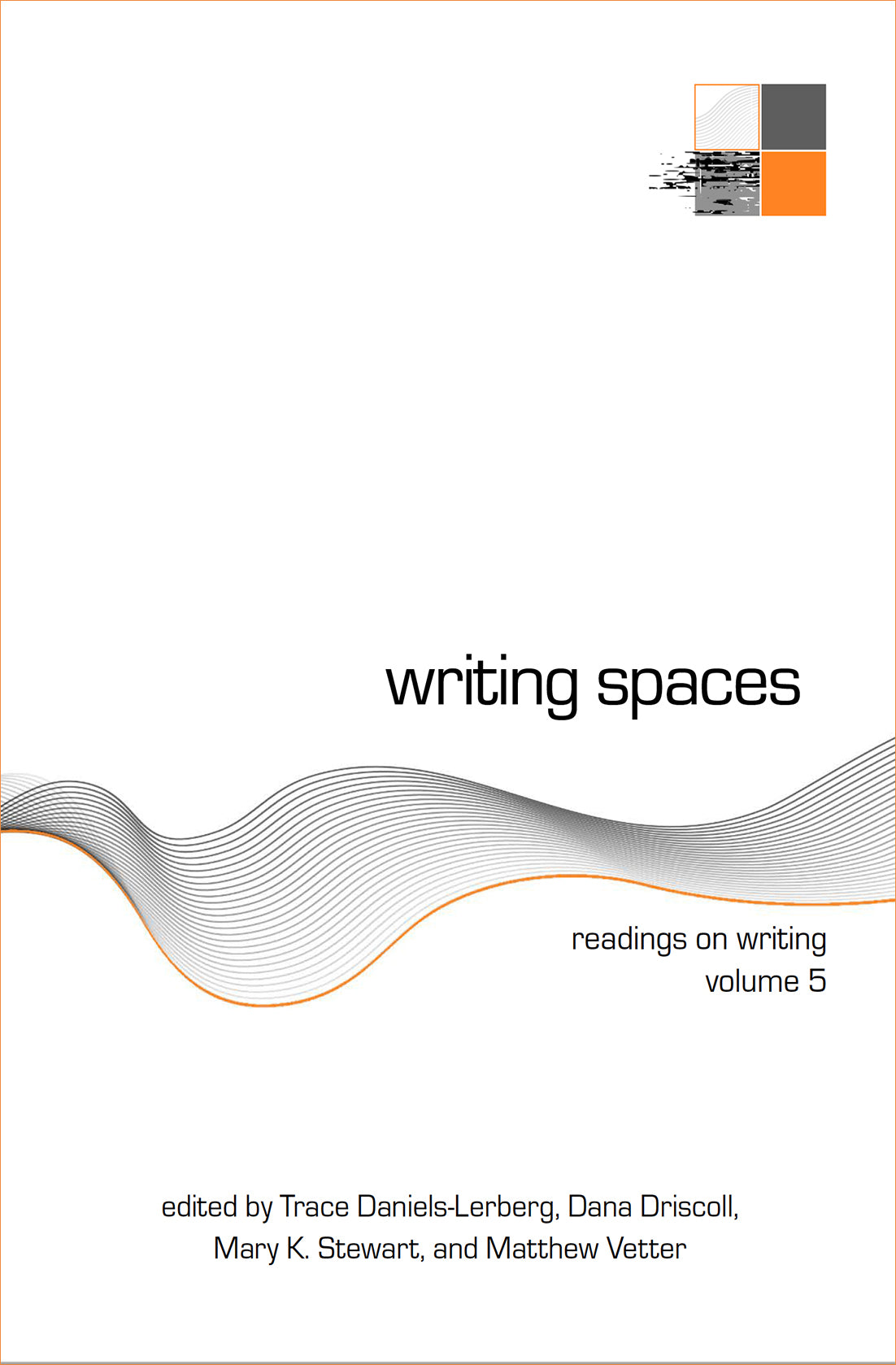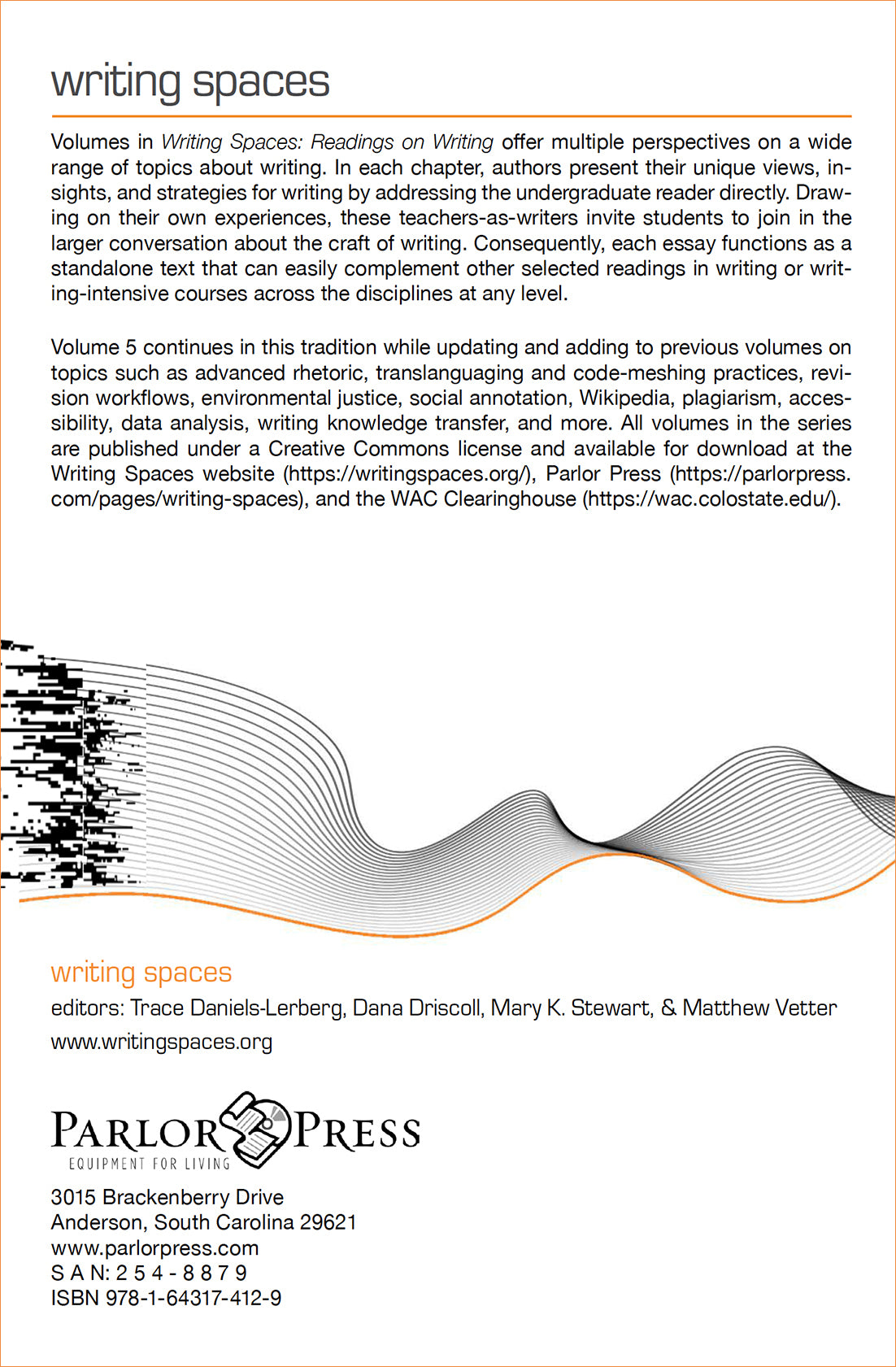Description
Edited by Trace Daniels-Lerberg, Dana Driscoll, Mary K. Stewart, and Matthew Vetter
Writing Spaces
Series Editors: Dana Driscoll, Mary Stewart, and Matthew Vetter
Information and Pricing
978-1-64317-411-2 (paperback; $36.95), 978-1-64317-412-9 (PDF, Free Download); 978-1-64317-413-6 (EPUB, Free Download) © 2023 by Parlor Press. 410 pages with illustrations, notes, and bibliography.
Unless otherwise stated, these works are licensed under the Creative Commons Attribution-NonCommercial-NoDerivatives 4.0 International License (CC BY-NC-ND 4.0) and are subject to the Writing Spaces Terms of Use. To view a copy of this license, visit http://creativecommons.org/licenses/by-nc-nd/4.0/, email info@creativecommons.org, or send a letter to Creative Commons, PO Box 1866, Mountain View, CA 94042, USA. To view the Writing Spaces Terms of Use, visit http://writingspaces.org/terms-of-use.
Bookstores: Order by fax, mail, or phone. See our "Sales and Ordering Page" for details.
Description
Volumes in Writing Spaces: Readings on Writing offer multiple perspectives on a wide range of topics about writing. In each chapter, authors present their unique views, insights, and strategies for writing by addressing the undergraduate reader directly. Drawing on their own experiences, these teachers-as-writers invite students to join in the larger conversation about the craft of writing. Consequently, each essay functions as a standalone text that can easily complement other selected readings in writing or writing-intensive courses across the disciplines at any level.
Volume 5 continues in this tradition while updating and adding to previous volumes on topics such as advanced rhetoric, translanguaging and code-meshing practices, revision workflows, environmental justice, social annotation, Wikipedia, plagiarism, accessibility, data analysis, writing knowledge transfer, and more. Contributors include David Blakesley, Rachel Buck, Ellen Cecil-Lemkin, Amy Cicchino, Kristin DeMint Bailey, Zack DePiero, Danielle DeRise, Kefaya Diab, Ryan Dippre, Sydney Doyle, William Duffy, Tamara Gluck, An Ha, L. Lennie Irvin, Erin E. Kelly, Angela M. Laflen, Glenn Lester, Taylor Lucas, Jason McIntosh, Benjamin Miller, Oksana Moroz, Anthony J. Outlar, Alison Overcash, Mattius Rischard, Michelle Sprouse, Christopher Thaiss, Lisa Tremain, Silvia Vaccino-Salvadore, Crystal VanKooten, Matthew Vetter, Stephanie Wade, and Jennifer Wells.
All volumes in the series are published under a Creative Commons license and available for download at the Writing Spaces website (https://writingspaces.org/), Parlor Press (https://parlorpress.com/pages/writing-spaces), and the WAC Clearinghouse (https://wac.colostate.edu/).
Contents
1 We Write Because We Care: Developing Your Writerly Identity
Glenn Lester, Sydney Doyle, Taylor Lucas, and Alison Overcash
2 Dispositions Toward Learning
Jennifer Wells
3 Is This for a Grade? Understanding Assessment, Evaluation, and Low-Stakes Writing Assignments
Jason McIntosh
4 How Writing Happens
Zack DePiero and Ryan Dippre
5 What Color Is My Voice? Academic Writing and the Myth of Standard English
Kristin DeMint Bailey, An Ha, and Anthony J. Outlar
6 What Can I Add to the Discourse Community? How Writers Use Code Meshing and Translanguaging to Negotiate Discourse
Lisa Tremain
7 Environmental Justice: Writing Urban Spaces
Mattius Rischard
8 Enabling the Reader
Kefaya Diab
9 Everything's Biased: A Guide to Determining When Bias Matters
Danielle DeRise
10 Reading in Conversation: A Student's Guide to Social Annotation
Michelle Sprouse
11 “I Passed First-Year Writing—What Now?” Adapting Strategies from First-Year Writing to Writing in the Disciplines
Amy Cicchino
12 Strategies for Analyzing and Composing Data Stories
Angela M. Laflen
13 “Doing Research Is Fun; Citing Sources Is Not”: Understanding the Fuzzy Definition of Plagiarism
Rachel Buck and Silvia Vaccino-Salvadore
14 Elaborate Rhetorics
David Blakesley
15 What Is Rhetoric? A "Choose Your Own Adventure" Primer
William Duffy
16 Thinking Across Modes and Media (and Baking Cake): Two Techniques for Writing with Video, Audio, and Images
Crystal VanKooten
17 You Are Good for Wikipedia
Matthew Vetter and Oksana Moroz
18 The Good, the Bad, and the Ugly of Peer Review
Erin E. Kelly
19 Changing your Mindset about Revision
L. Lennie Irvin
20 What’s the Diff? Version History and Revision Reflections
Benjamin Miller
21 Navigating Your Collaborative Project
Ellen Cecil-Lemkin and Tamara Gluck
22 Writing Science in the First Year of College: Why It Matters to STEM Students and How STEM Students Benefit from It
Christopher Thaiss and Stephanie Wade
Contributors


